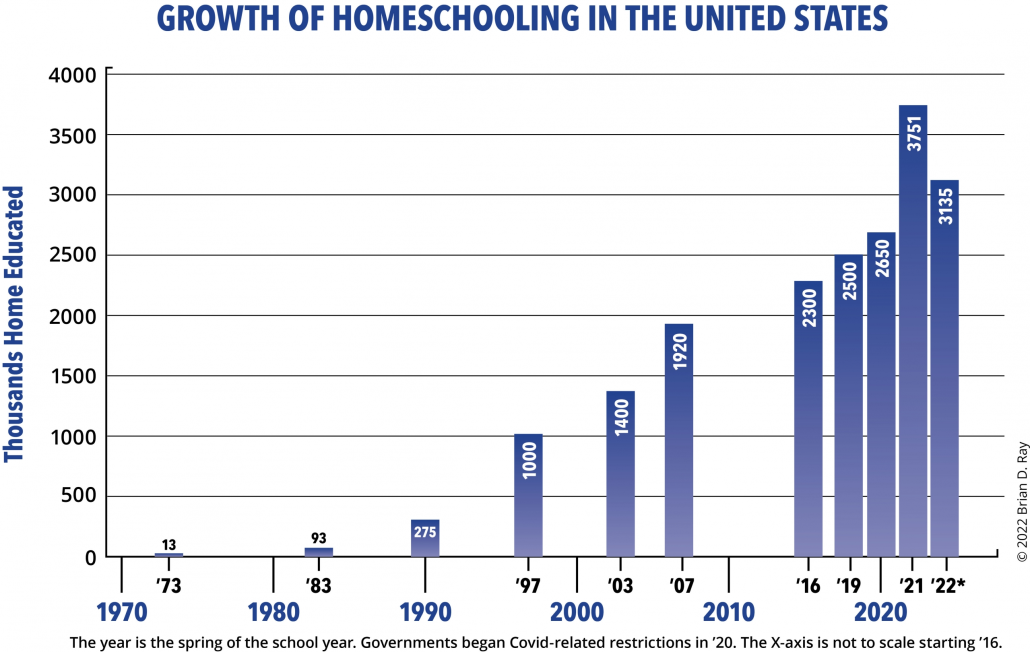Homeschooling is rapidly gaining popularity throughout the US. According to the United States Department of Education there are well over four million homeschooled children as of the 2023-24 school year and homeschooling is growing around 10% annually.
Homeschooling, sometimes referred to as unschooling, is a very broad term. The structure, style, and values vary widely between families, still some continuities do exist. The basic premise is an education at home with family. Similar to the Montessori school system, homeschooling focuses on the personal interest of the child, encourages exploration and curiosity, and often utilizes a more hands-on style of learning.
The average class size in public schools is around twenty, which limits the teachers ability to personalize lessons and focus on an individual student’s needs. Meanwhile, a child who is schooled at home receives one-on-one personalized attention every day. Homeschoolers lessons are designed specifically based on the students strengths, weaknesses, and learning style. If the student struggles with a certain topic they have the freedom and time to focus on that topic, try different approaches, and ultimately learn it much more thoroughly than a child who has to follow strict curriculums and time restraints. It also allows a kid to pursue their interest. If they find certain aspects of a lesson interesting they can spend days or weeks learning it. This allows the child to learn subjects on a deeper level and increase general knowledge over a range of fields.
One aspect found in most styles of homeschooling is the lack of testing. When testing is utilized there is little importance placed on results and it is used purely to see progress. Since homeschool curriculums are not standardized there is no need for traditional tests such as unit summatives and state tests. People often worry this leaves children underprepared but, contrary to popular belief, the National Home Education Research Institute, or the NHERI, found that homeschooled students actually outperform their public school peers by around 20-30% on standardized tests such as the ACT and SAT.
The NHERI also found that without the emphasis on testing students reported less stress and anxiety. Instead of test-centric curricula, homeschooling is more hands-on, creative, and child-led. It prioritizes play-based-learning and time spent outdoors.
“As I saw it, my five-year-old had three needs: to play, to make friends, and to follow his curiosity, but the environment in his kindergarten classes actually inhibited all three of these,” said Sarah Ligon, a mother of four former homeschoolers. “Recess was limited to 20 minutes a day. He was not allowed to talk during class time, so how was he to make friends? And he was so exhausted at the end of each school day so he actually gave up most of his interests.”
Instead of prioritizing learning facts for a test, homeschooling aims to encourage curiosity and promote lifelong learning.
“In homeschooling we try to teach them how to learn and not just worry about stuffing knowledge in their brains,” said homeschooling parent Katie Boyle. “If I can teach my kids how to learn I feel confident they can go out into the world and adapt and learn anything they need.”
“There is no system that covers everything so education should be lifelong.” said Adrienne Brown, another homeschooling parent.
A common misconception about homeschooling is that homeschooled children will fall behind their grade level and peers. On the contrary, homeschooled children consistently score on par in math and sciences and score above peers on histories and english.
“All of my kids were homeschooled until high school,” said Brown. “All have done very well academically in traditional school. They were consistently in AP classes and graduated with honors.”
When Ligons oldest child reached highschool he earned a full ride scholarship to a prestigious out of state boarding school and her other three children all do very well in school.
As for concerns about the future, statistics and studies from, the NHERI, ParentingMode.com, the Noah Webster Educational Foundation, and the Wall Street Journal have found that around 70% of homeschoolers graduate from a four-year college, which is 15% higher than the number of public school students who ever even enroll in a four year college. Homeschoolers perform higher on college entrance exams and have higher average GPAs in the first and fourth years of college. Post-college homeschooled students have a 60% higher greater chance of earning, are reportedly more involved members in the communities, and are more politically and culturally open minded.
A common stereotype of homeschoolers is a lack of social skills due to more limited opportunities to make friends. School is a natural way for kids to be pushed out of their comfort zones and group projects and field trips help nurture bonds and friendships, however there are many opportunities in the community for kids to stay engaged in activities and teams.
“There was a large vibrant homeschooling community in Oxford that supported me and my kids,” said Ligon. “That gave them their most important friendships and they then had the time and freedom to really nourish those friendships. We met up with our homeschool friends at least every other day. They also took violin, cello, and piano lessons, did soccer, dance, and taekwondo, and were involved with programs at church, the library and 4-H. My children are all now in traditional schools, but I still feel that homeschooling was the best part of their childhoods.”
The added freedom and flexibility in the homeschooling schedule actually allows for more opportunities.
“We could drop everything on an hour’s notice and meet our friends for a day-long adventure in the creek. It was lovely,” said Ligon. “They had all the field trips, all the class parties, all of the Valentine’s exchanges, and pumpkin patch field trips they would have had in a traditional school. But they also grew their own vegetables, raised baby chickens, baked bread. They learned to knit and sew, weave and whittle. They learned about chemistry, coral reefs, mythology and pottery. Anything they were interested in.”
“Across the board I found these homeschoolers to have a self assurance that was uncommon in kids their age,” Boyle said. “In my experience homeschoolers were actually far more confident and social then their peers.”
She says this was a leading factor in her decision to homeschool her children later on. Boyle was first introduced to the idea of homeschooling through her work at the Audubon Center, a nature reserve. She needed lots of help from volunteers and wanted to get kids involved. Many of the people who volunteered happened to be homeschoolers since they had extremely flexible schedules that allowed them the freedom to spend days out at the trails.
“They could talk easily at an adult level, they were responsible, they were hard workers, and they took a lot of pride in their work,” said Boyle. “I’d never met kids that age who were just across the board so mature. I just remember thinking ‘I hope these my kids are like this’ so when I had kids I decided to homeschool them.”
Overall homeschooling has been shown to result in higher academic performance, higher success rates in and after college, and more self confidence and maturity. Most communities have homeschooling families that help one another and youth teams and programs to keep kids involved and allow them chances to make friends. While homeschooling is not for everyone, it is definitely a viable option and provides a lot of unique options for a child’s education.








